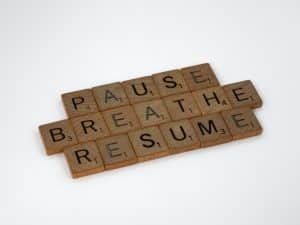
If you’ve spent some time on this site, you may have noticed that I’ve managed to post on topics related to using mindfulness in the MBA space three times per week for over a year and a half (<<pats self on back>>). Clearly, I feel there’s a lot to be said, and plenty of ground to cover. In case you’ve recently joined us, though, and have yet to binge-read the archives (on your to-do list, obviously), here’s an opportunity to get caught up. Or, perhaps more accurately, to understand the “why” for this voluntary labor of love.
With all the emphasis placed on going, moving, and producing in the MBA lifestyle, why in the world would you make the time to catch your breath? Where’s the value-add, you’re thinking – amirite? It’s ok, I get it. Fortunately, there’s plenty of ROI to be had, if you’re willing to make the investment.
So why bother with mindfulness if you’re on the fast track to the c-suite? Mindfulness matters in the MBA world because:
- Focus is a skill. Mindfulness is like a workout for your brain. When you train your focus on a single “anchor,” such as your breath, a mental image, an object in front of you, or a physical sensation, you are giving your brain the chance to practice focusing. When your mind wanders off to something else and you notice that it has, and intentionally come back to your point of focus, that’s a “rep” in your workout. You’re getting stronger (literally…your prefrontal cortex grows through this exercise), and more capable of keeping your attention where you want and need it to be in a given moment.
- People like people who make them feel heard. Ever found yourself accidentally checked-out of a conversation? You know you need to pay attention, and you may actually want to as well, but your brain went somewhere else, your eyes glazed over, and the person talking to you instantly decided that you don’t care about what they’re saying. If you’re in a leadership position, they may also have decided that what they’re saying doesn’t have value. Showing someone that you’re actually listening to them, with your body language and your engagement with the content (through summary, follow-up, etc.), makes people feel important to you. As a leader – and a human being – your relationships with the people around you can be transformed by simply being present for them in a perceptible manner (even HBR says so).
- Multi-tasking is a myth. Research has repeatedly shown that when we think we’re managing multiple tasks simultaneously, our brains are actually moving quickly among them, one at a time. If you’ve ever been repeatedly interrupted while trying to complete a task, then you know that this process of leap-frogging around isn’t great for productivity. Projects take longer and are more likely to include errors when you’ve shifted your attention repeatedly to and from them. If you want to get something done, focus on it, and get it done.
- Mental clarity is great for problem-solving. What do leaders do all day long? Put out fires. Establish priorities. Solve problems. The average day of someone in a leadership position involves countless feats of mental gymnastics that require – you guessed it – focus. You’re less likely to develop a genius solution to an unexpected monkeywrench in your plans when your brain is full of noise about a million other things. Find your focus, and find your brilliance.
- Staying calm under stress is a leadership superpower. Leaders who lose it when the going gets rough aren’t leaders for long. In the midst of uncertainty, teams look to leaders to reassure them that the ship has not in fact struck an iceberg. Mindfulness helps you develop the ability to feel the fear but keep going anyway, without letting it sweep you away into the panic zone. It’s not about denying your emotions, but learning to co-exist with them, without giving them permission to lead you where you don’t want to go. You’re in charge, right? That’s what I thought.
Mindfulness helps to calm your body and clarify your mind under stress, but it isn’t about taking things down a notch. It’s about accessing the focus, clarity, productivity, creativity and strength that are already within you. It’s about getting out of your own way, and seeing where your gifts can take you when you do.
The ability to connect with all of these leadership qualities deliberately is far from weakness. In fact, it’s power. All you have to do to tap into it is catch your breath….and that’s what we mean by unleashing your potential.
Photo credit: Gilles Lambert




1 thought on “Power center”
Pingback: Ride it out | MindfulMBA